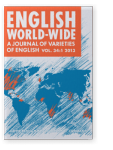Vol. 34:1 (2013) ► pp.1–25
The expression of the perfect in East and South-East Asian Englishes
This paper looks at variation in the expression of perfect meaning in Asian Englishes (Hong Kong, India, Singapore and the Philippines) as represented in the spoken component of the International Corpus of English. Findings confirm the existence of levelling between the present perfect and simple past in these varieties, and that the tendency of the present perfect to lose ground to the preterite is more pronounced in these New Englishes than in British English, especially in the expression of recent past. The occurrence of other variants in the corpus is accounted for in terms of the influence of the respective substrate languages, cognitive constraints characteristic of language-contact situations, pragmatic contextual factors such as the scant use of adverbial support, and, especially, diffusion from the input language, which is an earlier variety of spoken, non-standard English. Relevant intravarietal differences are also discussed and attributed to the different phases of development in which the four varieties currently find themselves.
Cited by (18)
Cited by 18 other publications
This list is based on CrossRef data as of 2 july 2024. Please note that it may not be complete. Sources presented here have been supplied by the respective publishers. Any errors therein should be reported to them.
